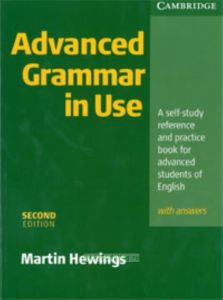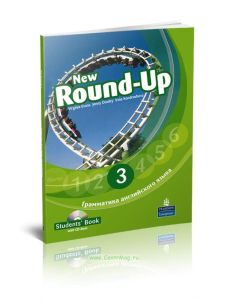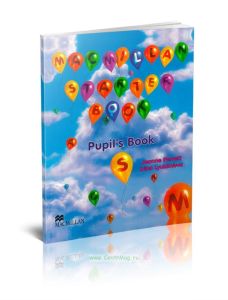- Артикул:00004299
- Автор: Martin Hewings
- ISBN: 978-0-521-53291-4
- Обложка: Мягкая обложка
- Издательство: Cambridge University Press (все книги издательства)
- Город: Cambridge
- Страниц: 294
- Формат: А4 (210x290 мм)
- Год: 2009
- Вес: 660 г
Advanced Grammar in Use (Second Edition)
A self-study reference and practice book for advanced students of English.
"Advanced Grammar in Use" second edition is a fully updated version of the successful grammar title.
This new edition:
contains 100 units of grammar reference and practice materials including seven completely new units.
includes new additional exercises, appendices and coverage more specifically aimed at the advanced learner.
has a comprehensive Grammar Review to allow learners to check language areas they have already studied.
is informed by the Cambridge International Corpus to ensure the language is authentic and up-to-date.
provides ideal support for students preparing for Cambridge Advanced Examination in English, Cambridge Proficiency or the IELT5 examination.
The exciting new CD-ROM offers additional practice material covering all the language taught in the book.
The CD-ROM includes:
hundreds of practice exercises for all the units in the book.
practice guides for key language areas of the book.
customised tests targeting specific language areas.
audio recordings of all main exercises.
a built-in dictionary and a link to Cambridge Dictionaries Online allowing students to look up any words they need.
Содержание
Thanks
To the student
To the teacher
Tenses
1 Present continuous and present simple (1)
2 Present continuous and present simple (2)
3 Past simple and present perfect
4 Past continuous and past simple
5 Past perfect and past simple
6 Present perfect continuous and present perfect
7 Past perfect continuous, past perfect and past continuous
8 Present and past time: review
The future
9 Will and be going to
10 Present simple and present continuous for the future
11 Future continuous and future perfect (continuous)
12 Be to + infinitive
13 Other ways of talking about the future
14 The future seen from the past
Modals and semi-modals
15 Can, could, be able to and be allowed to
16 Will, would and used to
17 May and might: possibility
18 Must and have (got) to
19 Need(n't), don't need to and don't have to
20 Should, ought to and had better
Linking verbs, passives, questions
21 Linking verbs: be, appear, seem; become, get, etc.
22 Forming passive sentences (1)
23 Forming passive sentences (2): verb + -ing or to-infinitive
24 Using passives
25 Reporting with passive verbs; It is said that...
26 Wh-questions with who, whom, which, how and whose
27 Negative questions; echo questions; questions with that-clauses
Verb complementation: what follows verbs
28 Verbs, objects and complements
29 Verb + two objects
30 Verb +-ing forms and infinitives (1)
31 Verb + -ing forms and infinitives (2)
Reporting
32 Reporting people's words and thoughts
33 Reporting statements: that-clauses
34 Verb + wh-clause
35 Tense choice in reporting
36 Reporting offers, suggestions, orders, intentions, etc.
37 Modal verbs in reporting
38 Reporting what people say using nouns and adjectives
39 Should in that-clauses; the present subjunctive
Nouns
40 Agreement between subject and verb (1)
41 Agreement between subject and verb (2)
42 Agreement between subject and verb (3)
43 Compound nouns and noun phrases
Articles, determiners and quantifiers
44 A/an and one
45 A/an, the and zero article (1)
46 A/an, the and zero article (2)
47 A/an, the and zero article (3)
48 Some and any
49 No, none (of) and not any
50 Much (of), many (of) a lot of, lots (of), etc.
51 AH (of), whole, every, each
52 Few, little, less, fewer
Relative clauses and other types of clause
53 Relative pronouns
54 Other relative words: whose, when, whereby, etc.
55 Prepositions in relative clauses
56 Other ways of adding information to noun phrases (1): additional noun phrases, etc.
57 Other ways of adding information to noun phrases (2): prepositional phrases, etc.
58 Participle clauses with adverbial meaning (1)
59 Participle clauses with adverbial meaning (2)
Pronouns, substitution and leaving out words
60 Reflexive pronouns: herself, himself, themselves, etc.
61 One and ones
62 So and not as substitutes for clauses, etc.
63 Do so; such
64 More on leaving out words after auxiliary verbs
65 Leaving out to-infinitives
Adjectives and adverbs
66 Position of adjectives
67 Gradable and non-gradable adjectives (1)
68 Gradable and non-gradable adjectives (2)
69 Participle adjectives and compound adjectives
70 Adjectives + to-infinitive, -ing, that-clause, wh-clause
71 Adjectives and adverbs
72 Adjectives and adverbs: comparative and superlative forms
73 Comparative phrases and clauses
74 Position of adverbs (1)
75 Position of adverbs (2)
76 Adverbs of place, direction, indefinite frequency, and time
77 Degree adverbs and focus adverbs
78 Comment adverbs and viewpoint adverbs
Adverbial clauses and conjunctions
79 Adverbial clauses of time
80 Giving reasons: as, because, etc.; for and with
81 Purposes and results: in order to, so as to, etc.
82 Contrasts: although and though; even though/if; while, whilst and whereas
83 If (1)
84 If (2)
85 If I were you...; imagine he were to win
86 If...not and unless; if and whether; etc.
87 Connecting ideas in a sentence and between sentences
Prepositions
88 Prepositions of position and movement
89 Between and among
90 Prepositions of time
91 Talking about exceptions
92 Prepositions after verbs
93 Prepositions after nouns
94 Two- and three-word verbs: word order
Organising information
95 There is, there was, etc.
96 It... (1)
97 It... (2)
98 Focusing: it-clauses and what-clauses
99 Inversion (1)
100 Inversion (2)
Grammar review Glossary
Appendix 1 Passive verb forms
Appendix 2 Basic question forms
Appendix 3 Quoting what people think or what they have said
Appendix 4 Irregular verbs
Additional exercises
Study Guide
Key to Exercises
Key to Additional exercises
Key to Study guide
Index
Рекомендуем





